Shop for Plans
Shop for your own coverage
Plans through your employer
Learn about the medical, dental, pharmacy, behavioral, and voluntary benefits your employer may offer.
Learn
Living or working abroad?
Esophageal Cancer Treatment (PDQ®): Treatment - Patient Information [NCI]
General Information About Esophageal Cancer
Esophageal cancer is a disease in which malignant (cancer) cells form in the tissues of the esophagus.
The esophagus is the hollow, muscular tube that moves food and liquid from the throat to the stomach. The wall of the esophagus is made up of several layers of tissue, including mucous membrane, muscle, and connective tissue. Esophageal cancer starts on the inside lining of the esophagus and spreads outward through the other layers as it grows.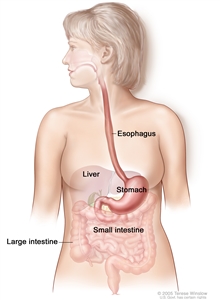
The esophagus and stomach are part of the upper gastrointestinal (digestive) system.
The two most common forms of esophageal cancer are named for the type of cells that become malignant (cancerous):
- Squamous cell carcinoma: Cancer that forms in the thin, flat cells lining the inside of the esophagus. This cancer is most often found in the upper and middle part of the esophagus, but can occur anywhere along the esophagus. This is also called epidermoid carcinoma.
- Adenocarcinoma: Cancer that begins in glandular cells. Glandular cells in the lining of the esophagus produce and release fluids such as mucus. Adenocarcinomas usually form in the lower part of the esophagus, near the stomach.
Smoking, heavy alcohol use, and Barrett esophagus can increase the risk of esophageal cancer.
Anything that increases your risk of getting a disease is called a risk factor. Having a risk factor does not mean that you will get cancer; not having risk factors doesn't mean that you will not get cancer. Talk with your doctor if you think you may be at risk. Risk factors include the following:
- Tobacco use.
- Heavy alcohol use.
- Barrett esophagus: A condition in which the cells lining the lower part of the esophagus have changed or been replaced with abnormal cells that could lead to cancer of the esophagus. Gastric reflux (heartburn) is the most common cause of Barrett esophagus.
- Older age.
Signs and symptoms of esophageal cancer are weight loss and painful or difficult swallowing.
These and other signs and symptoms may be caused by esophageal cancer or by other conditions. Check with your doctor if you have any of the following:
- Painful or difficult swallowing.
- Weight loss.
- Pain behind the breastbone.
- Hoarseness and cough.
- Indigestion and heartburn.
- A lump under the skin.
Tests that examine the esophagus are used to diagnose esophageal cancer.
The following tests and procedures may be used:
- Physical exam and health history: An exam of the body to check general signs of health, including checking for signs of disease, such as lumps or anything else that seems unusual. A history of the patient's health habits and past illnesses and treatments will also be taken.
- Chest x-ray: An x-ray of the organs and bones inside the chest. An x-ray is a type of energy beam that can go through the body and onto film, making a picture of areas inside the body.
- Esophagoscopy: A procedure to look inside the esophagus to check for abnormal areas. An esophagoscope is inserted through the mouth or nose and down the throat into the esophagus. An esophagoscope is a thin, tube-like instrument with a light and a lens for viewing. It may also have a tool to remove tissue samples, which are checked under a microscope for signs of cancer. When the esophagus and stomach are looked at, it is called an upper endoscopy.

Esophagoscopy. A thin, lighted tube is inserted through the mouth and into the esophagus to look for abnormal areas. - Biopsy: The removal of cells or tissues so they can be viewed under a microscope by a pathologist to check for signs of cancer. The biopsy is usually done during an esophagoscopy. Sometimes a biopsy shows changes in the esophagus that are not cancer but may lead to cancer.
Certain factors affect prognosis (chance of recovery) and treatment options.
The prognosis and treatment options depend on the following:
- The stage of the cancer (whether it affects part of the esophagus, involves the whole esophagus, or has spread to other places in the body).
- Whether the tumor can be completely removed by surgery.
- The patient's general health.
When esophageal cancer is found very early, there is a better chance of recovery. Esophageal cancer is often in an advanced stage when it is diagnosed. At later stages, esophageal cancer can be treated but rarely can be cured. Taking part in one of the clinical trials being done to improve treatment should be considered. Information about ongoing clinical trials is available from the
Stages of Esophageal Cancer
After esophageal cancer has been diagnosed, tests are done to find out if cancer cells have spread within the esophagus or to other parts of the body.
The process used to find out if cancer cells have spread within the esophagus or to other parts of the body is called staging. The information gathered from the staging process determines the stage of the disease. It is important to know the stage in order to plan treatment. The following tests and procedures may be used in the staging process:
- Endoscopic ultrasound (EUS): A procedure in which an endoscope is inserted into the body, usually through the mouth or rectum. For esophageal cancer, the endoscope is inserted through the mouth. An endoscope is a thin, tube-like instrument with a light and a lens for viewing. A probe at the end of the endoscope is used to bounce high-energy sound waves (ultrasound) off internal tissues or organs and make echoes. The echoes form a picture of body tissues called a sonogram. A biopsy may also be done. This procedure is also called endosonography.
- CT scan (CAT scan): A procedure that makes a series of detailed pictures of areas inside the body, such as the chest, abdomen, and pelvis, taken from different angles. The pictures are made by a computer linked to an x-ray machine. A dye may be injected into a vein or swallowed to help the organs or tissues show up more clearly. This procedure is also called computed tomography, computerized tomography, or computerized axial tomography.
- PET scan (positron emission tomography scan): A procedure to find malignant tumor cells in the body. A small amount of radioactive glucose (sugar) is injected into a vein. The PET scanner rotates around the body and makes a picture of where glucose is being used in the body. Malignant tumor cells show up brighter in the picture because they are more active and take up more glucose than normal cells do. A PET scan and CT scan may be done at the same time. This is called a PET-CT.
- MRI (magnetic resonance imaging): A procedure that uses a magnet, radio waves, and a computer to make a series of detailed pictures of areas inside the body. This procedure is also called nuclear magnetic resonance imaging (NMRI).
- Thoracoscopy: A surgical procedure to look at the organs inside the chest to check for abnormal areas. An incision (cut) is made between two ribs and a thoracoscope is inserted into the chest. A thoracoscope is a thin, tube-like instrument with a light and a lens for viewing. It may also have a tool to remove tissue or lymph node samples, which are checked under a microscope for signs of cancer. In some cases, this procedure may be used to remove part of the esophagus or lung.
- Laparoscopy: A surgical procedure to look at the organs inside the abdomen to check for signs of disease. Small incisions (cuts) are made in the wall of the abdomen and a laparoscope (a thin, lighted tube) is inserted into one of the incisions. Other instruments may be inserted through the same or other incisions to perform procedures such as removing organs or taking tissue samples to be checked under a microscope for signs of disease.
- Ultrasound exam: A procedure in which high-energy sound waves (ultrasound) are bounced off internal tissues or organs, such as those in the neck, and make echoes. The echoes form a picture of body tissues called a sonogram. The picture can be printed to be looked at later.
There are three ways that cancer spreads in the body.
Cancer can spread through tissue, the lymph system, and the blood:
- Tissue. The cancer spreads from where it began by growing into nearby areas.
- Lymph system. The cancer spreads from where it began by getting into the lymph system. The cancer travels through the lymph vessels to other parts of the body.
- Blood. The cancer spreads from where it began by getting into the blood. The cancer travels through the blood vessels to other parts of the body.
Cancer may spread from where it began to other parts of the body.
When cancer spreads to another part of the body, it is called metastasis. Cancer cells break away from where they began (the primary tumor) and travel through the lymph system or blood.
- Lymph system. The cancer gets into the lymph system, travels through the lymph vessels, and forms a tumor (metastatic tumor) in another part of the body.
- Blood. The cancer gets into the blood, travels through the blood vessels, and forms a tumor (metastatic tumor) in another part of the body.
The metastatic tumor is the same type of cancer as the primary tumor. For example, if esophageal cancer spreads to the lung, the cancer cells in the lung are actually esophageal cancer cells. The disease is metastatic esophageal cancer, not lung cancer.
The grade of the tumor is also used to describe the cancer and plan treatment.
The grade of the tumor describes how abnormal the cancer cells look under a microscope and how quickly the tumor is likely to grow and spread. Grades 1 to 3 are used to describe esophageal cancer:
- In grade 1, the cancer cells look more like normal cells under a microscope and grow and spread more slowly than grade 2 and 3 cancer cells.
- In grade 2, the cancer cells look more abnormal under a microscope and grow and spread more quickly than grade 1 cancer cells.
- In grade 3, the cancer cells look more abnormal under a microscope and grow and spread more quickly than grade 1 and 2 cancer cells.
The following stages are used for squamous cell carcinoma of the esophagus:
Stage 0 (High-grade Dysplasia)
In stage 0, cancer has formed in the inner lining of the esophagus wall. Stage 0 is also called high-grade dysplasia.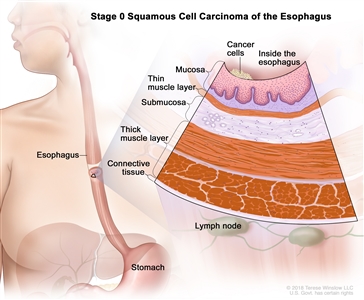
Stage 0 squamous cell carcinoma of the esophagus. Cancer has formed in the inner lining of the esophagus wall.
Stage I squamous cell carcinoma of the esophagus
Stage I is divided into stages IA and IB, depending on where the cancer has spread.
- Stage IA: Cancer has spread into the mucosa layer or thin muscle layer of the esophagus wall. The cancer cells are grade 1 or the grade is not known.
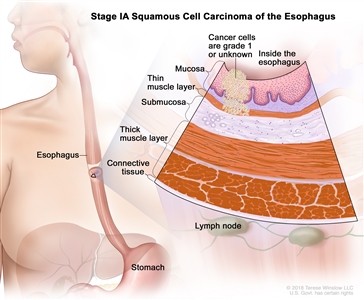
Stage IA squamous cell carcinoma of the esophagus. Cancer has spread into the mucosa layer or thin muscle layer of the esophagus wall. The cancer cells are grade 1 or the grade is not known. Grade 1 cancer cells look more like normal cells under a microscope and grow and spread more slowly than grade 2 and 3 cancer cells. - Stage IB: Cancer has spread:
- into the mucosa layer, thin muscle layer, or submucosa layer of the esophagus wall. The cancer cells are any grade or the grade is not known; or
- into the thick muscle layer of the esophagus wall. The cancer cells are grade 1.
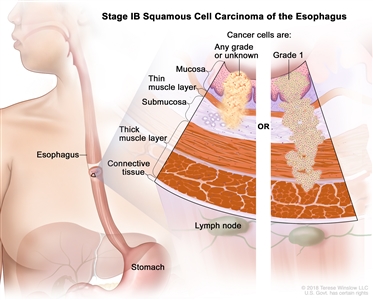
Stage IB squamous cell carcinoma of the esophagus. Cancer has spread into the mucosa layer, thin muscle layer, or submucosa layer of the esophagus wall. The cancer cells are any grade or the grade is not known; OR cancer has spread into the thick muscle layer of the esophagus wall. The cancer cells are grade 1. Grade 1 cancer cells look more like normal cells under a microscope and grow and spread more slowly than grade 2 and 3 cancer cells.
Stage II squamous cell carcinoma of the esophagus
Stage II is divided into stages IIA and IIB, depending on where the cancer has spread.
- Stage IIA: Cancer has spread:
- into the thick muscle layer of the esophagus wall. The cancer cells are grade 2 or 3 or the grade is not known; or
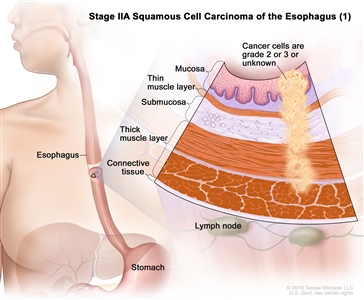
Stage IIA squamous cell carcinoma of the esophagus (1). Cancer has spread into the thick muscle layer of the esophagus wall. The cancer cells are grade 2 or 3 or the grade is not known. Grade 2 and 3 cancer cells look more abnormal under a microscope and grow and spread more quickly than grade 1 cancer cells. - into the connective tissue layer of the esophagus wall. The tumor is in the lower esophagus; or
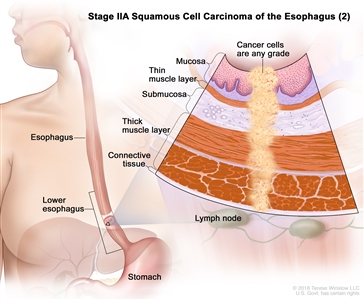
Stage IIA squamous cell carcinoma of the esophagus (2). Cancer has spread into the connective tissue layer of the esophagus wall. The tumor is in the lower esophagus. - into the connective tissue layer of the esophagus wall. The cancer cells are grade 1. The tumor is in either the upper or middle esophagus.
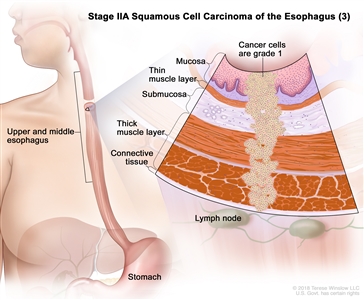
Stage IIA squamous cell carcinoma of the esophagus (3). Cancer has spread into the connective tissue layer of the esophagus wall. The cancer cells are grade 1. Grade 1 cancer cells look more like normal cells under a microscope and grow and spread more slowly than grade 2 and 3 cancer cells. The tumor is in either the upper or middle esophagus.
- into the thick muscle layer of the esophagus wall. The cancer cells are grade 2 or 3 or the grade is not known; or
- Stage IIB: Cancer has spread:
- into the connective tissue layer of the esophagus wall. The cancer cells are grade 2 or 3. The tumor is in either the upper or middle esophagus; or
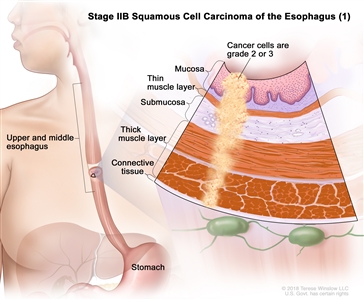
Stage IIB squamous cell carcinoma of the esophagus (1). Cancer has spread into the connective tissue layer of the esophagus wall. The cancer cells are grade 2 or 3. Grade 2 and 3 cancer cells look more abnormal under a microscope and grow and spread more quickly than grade 1 cancer cells. The tumor is in either the upper or middle esophagus. - into the connective tissue layer of the esophagus wall. The grade of the cancer cells is not known, or it is not known where the tumor has formed in the esophagus; or
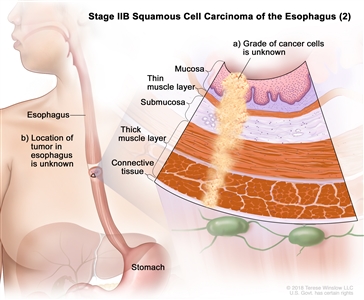
Stage IIB squamous cell carcinoma of the esophagus (2). Cancer has spread into the connective tissue layer of the esophagus wall. The grade of the cancer cells is not known, or it is not known where the tumor has formed in the esophagus. - into the mucosa layer, thin muscle layer, or submucosa layer of the esophagus wall. Cancer is found in 1 or 2 lymph nodes near the tumor.
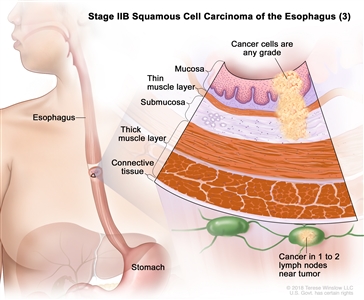
Stage IIB squamous cell carcinoma of the esophagus (3). Cancer has spread into the mucosa layer, thin muscle layer, or submucosa layer of the esophagus wall. Cancer is found in 1 to 2 lymph nodes near the tumor.
- into the connective tissue layer of the esophagus wall. The cancer cells are grade 2 or 3. The tumor is in either the upper or middle esophagus; or
Stage III squamous cell carcinoma of the esophagus
Stage III is divided into stages IIIA and IIIB, depending on where the cancer has spread.
- Stage IIIA: Cancer has spread:
- into the mucosa layer, thin muscle layer, or submucosa layer of the esophagus wall. Cancer is found in 3 to 6 lymph nodes near the tumor; or
- into the thick muscle layer of the esophagus wall. Cancer is found in 1 or 2 lymph nodes near the tumor.
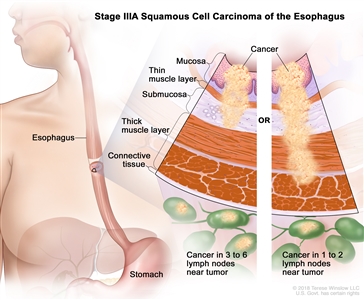
Stage IIIA squamous cell carcinoma of the esophagus. Cancer has spread into the mucosa layer, thin muscle layer, or submucosa layer of the esophagus wall. Cancer is found in 3 to 6 lymph nodes near the tumor; OR cancer has spread into the thick muscle layer of the esophagus wall. Cancer is found in 1 to 2 lymph nodes near the tumor.
- Stage IIIB: Cancer has spread:
- into the thick muscle layer or the connective tissue layer of the esophagus wall. Cancer is found in 1 to 6 lymph nodes near the tumor; or
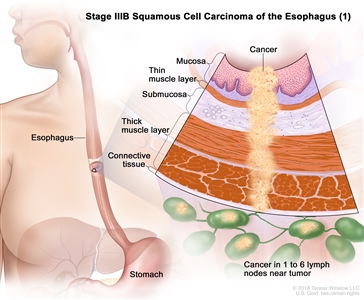
Stage IIIB squamous cell carcinoma of the esophagus (1). Cancer has spread into the thick muscle layer or the connective tissue layer of the esophagus wall. Cancer is found in 1 to 6 lymph nodes near the tumor. - into the diaphragm, azygos vein, pleura, sac around the heart, or peritoneum. Cancer may be found in 0 to 2 lymph nodes near the tumor.
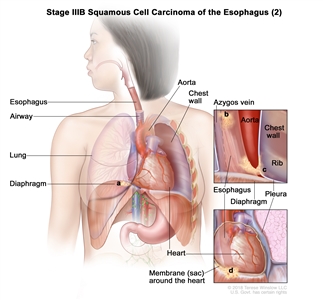
Stage IIIB squamous cell carcinoma of the esophagus (2). Cancer has spread into the (a) diaphragm, (b) azygos vein, (c) pleura, (d) sac around the heart, or peritoneum (not shown). Cancer may be found in 0 to 2 lymph nodes near the tumor.
- into the thick muscle layer or the connective tissue layer of the esophagus wall. Cancer is found in 1 to 6 lymph nodes near the tumor; or
Stage IV squamous cell carcinoma of the esophagus
Stage IV is divided into stages IVA and IVB, depending on where the cancer has spread.
- Stage IVA: Cancer has spread:
- into the diaphragm, azygos vein, pleura, sac around the heart, or peritoneum. Cancer is found in 3 to 6 lymph nodes near the tumor; or
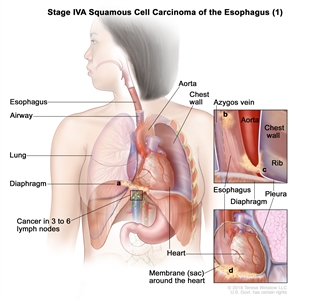
Stage IVA squamous cell carcinoma of the esophagus (1). Cancer has spread into the (a) diaphragm, (b) azygos vein, (c) pleura, (d) sac around the heart, or peritoneum (not shown). Cancer is found in 3 to 6 lymph nodes near the tumor. - into nearby structures, such as the aorta, airway, or spine. Cancer may be found in 0 to 6 lymph nodes near the tumor; or
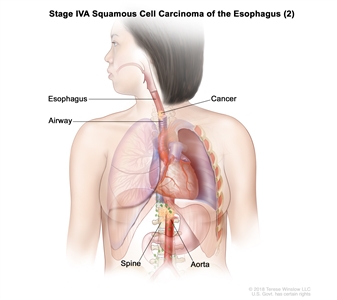
Stage IVA squamous cell carcinoma of the esophagus (2). Cancer has spread into nearby structures, such as the airway, aorta, or spine. Cancer may be found in 0 to 6 lymph nodes near the tumor. - to 7 or more lymph nodes near the tumor.
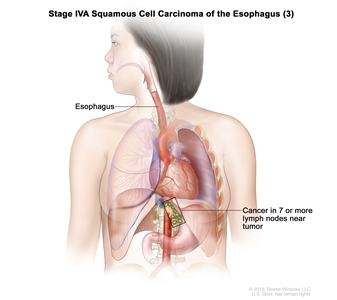
Stage IVA squamous cell carcinoma of the esophagus (3). Cancer has spread to 7 or more lymph nodes near the tumor.
- into the diaphragm, azygos vein, pleura, sac around the heart, or peritoneum. Cancer is found in 3 to 6 lymph nodes near the tumor; or
- Stage IVB: Cancer has spread to other parts of the body, such as the liver or lung.
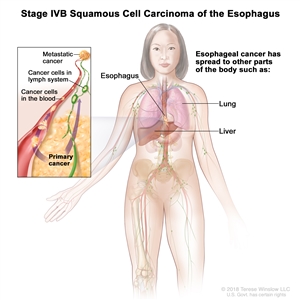
Stage IVB squamous cell carcinoma of the esophagus. Cancer has spread to other parts of the body, such as the liver or lung.
The following stages are used for adenocarcinoma of the esophagus:
Stage 0 (High-grade Dysplasia)
In stage 0, cancer has formed in the inner lining of the esophagus wall. Stage 0 is also called high-grade dysplasia.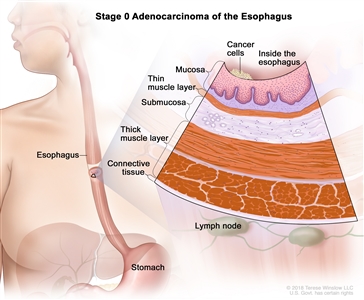
Stage 0 adenocarcinoma of the esophagus. Cancer has formed in the inner lining of the esophagus wall.
Stage I adenocarcinoma of the esophagus
Stage I is divided into stages IA, IB, and IC, depending on where the cancer has spread.
- Stage IA: Cancer has spread into the mucosa layer or thin muscle layer of the esophagus wall. The cancer cells are grade 1 or the grade is not known.
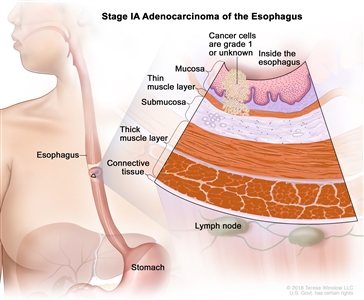
Stage IA adenocarcinoma of the esophagus. Cancer has spread into the mucosa layer or thin muscle layer of the esophagus wall. The cancer cells are grade 1 or the grade is not known. Grade 1 cancer cells look more like normal cells under a microscope and grow and spread more slowly than grade 2 and 3 cancer cells. - Stage IB: Cancer has spread:
- into the mucosa layer or thin muscle layer of the esophagus wall. The cancer cells are grade 2; or
- into the submucosa layer of the esophagus wall. The cancer cells are grade 1 or 2 or the grade is not known.
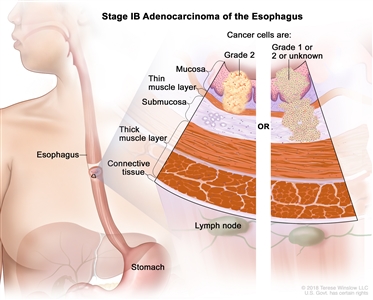
Stage IB adenocarcinoma of the esophagus. Cancer has spread into the mucosa layer or thin muscle layer of the esophagus wall. The cancer cells are grade 2. Grade 2 cancer cells look more abnormal under a microscope and grow and spread more quickly than grade 1 cancer cells; OR cancer has spread into the submucosa layer of the esophagus wall. The cancer cells are grade 1 or 2 or the grade is not known. - Stage IC: Cancer has spread:
- into the mucosa layer, thin muscle layer, or submucosa layer of the esophagus wall. The cancer cells are grade 3; or
- into the thick muscle layer of the esophagus wall. The cancer cells are grade 1 or 2.
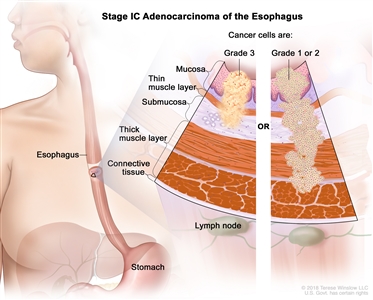
Stage IC adenocarcinoma of the esophagus. Cancer has spread into the mucosa layer, thin muscle layer, or submucosa layer of the esophagus wall. The cancer cells are grade 3. Grade 3 cancer cells look more abnormal under a microscope and grow and spread more quickly than grade 1 and 2 cancer cells; OR cancer has spread into the thick muscle layer of the esophagus wall. The cancer cells are grade 1 or 2.
Stage II adenocarcinoma of the esophagus
Stage II is divided into stages IIA and IIB, depending on where the cancer has spread.
- Stage IIA: Cancer has spread into the thick muscle layer of the esophagus wall. The cancer cells are grade 3 or the grade is not known.
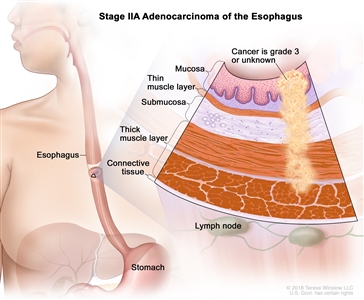
Stage IIA adenocarcinoma of the esophagus. Cancer has spread into the thick muscle layer of the esophagus wall. The cancer cells are grade 3 or the grade is not known. Grade 3 cancer cells look more abnormal under a microscope and grow and spread more quickly than grade 1 and 2 cancer cells. - Stage IIB: Cancer has spread:
- into the layer of the esophagus wall; or
- into the mucosa layer, thin muscle layer, or submucosa layer of the esophagus wall. Cancer is found in 1 or 2 lymph nodes near the tumor.
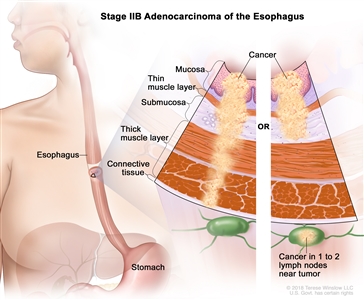
Stage IIB adenocarcinoma of the esophagus. Cancer has spread into the connective tissue layer of the esophagus wall; OR cancer has spread into the mucosa layer, thin muscle layer, or submucosa layer of the esophagus wall. Cancer is found in 1 to 2 lymph nodes near the tumor.
Stage III adenocarcinoma of the esophagus
Stage III is divided into stages IIIA and IIIB, depending on where the cancer has spread.
- Stage IIIA: Cancer has spread:
- into the mucosa layer, thin muscle layer, or submucosa layer of the esophagus wall. Cancer is found in 3 to 6 lymph nodes near the tumor; or
- into the thick muscle layer of the esophagus wall. Cancer is found in 1 or 2 lymph nodes near the tumor.
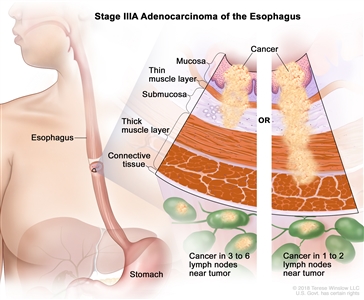
Stage IIIA adenocarcinoma of the esophagus. Cancer has spread into the mucosa layer, thin muscle layer, or submucosa layer of the esophagus wall. Cancer is found in 3 to 6 lymph nodes near the tumor; OR cancer has spread into the thick muscle layer of the esophagus wall. Cancer is found in 1 to 2 lymph nodes near the tumor. - Stage IIIB: Cancer has spread:
- into the thick muscle layer of the esophagus wall. Cancer is found in 3 to 6 lymph nodes near the tumor; or
- into the connective tissue layer of the esophagus wall. Cancer is found in 1 to 6 lymph nodes near the tumor; or
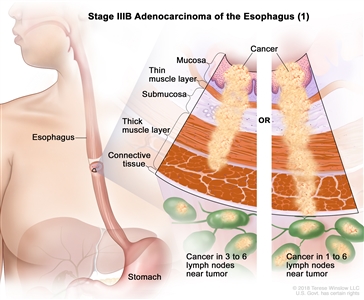
Stage IIIB adenocarcinoma of the esophagus (1). Cancer has spread into the thick muscle layer of the esophagus wall. Cancer is found in 3 to 6 lymph nodes near the tumor; OR cancer has spread into the connective tissue layer of the esophagus wall. Cancer is found in 1 to 6 lymph nodes near the tumor. - into the diaphragm, azygos vein, pleura, sac around the heart, or peritoneum. Cancer may be found in 0 to 2 lymph nodes near the tumor.
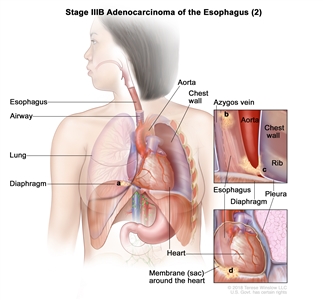
Stage IIIB adenocarcinoma of the esophagus (2). Cancer has spread into the (a) diaphragm, (b) azygos vein, (c) pleura, (d) sac around the heart, or peritoneum (not shown). Cancer may be found in 0 to 2 lymph nodes near the tumor.
Stage IV adenocarcinoma of the esophagus
Stage IV is divided into stages IVA and IVB, depending on where the cancer has spread.
- Stage IVA: Cancer has spread:
- into the diaphragm, azygos vein, pleura, sac around the heart, or peritoneum. Cancer is found in 3 to 6 lymph nodes near the tumor; or
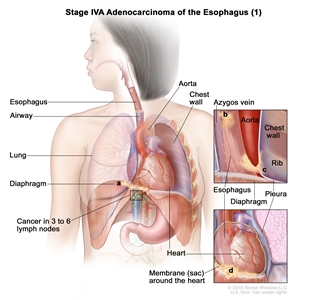
Stage IVA adenocarcinoma of the esophagus (1). Cancer has spread into the (a) diaphragm, (b) azygos vein, (c) pleura, (d) sac around the heart, or peritoneum (not shown). Cancer is found in 3 to 6 lymph nodes near the tumor. - into nearby structures, such as the aorta, airway, or spine. Cancer may be found in 0 to 6 lymph nodes near the tumor; or
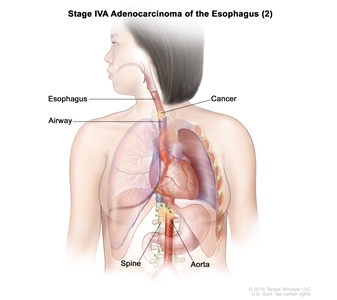
Stage IVA adenocarcinoma of the esophagus (2). Cancer has spread into nearby structures, such as the airway, aorta, or spine. Cancer may be found in 0 to 6 lymph nodes near the tumor. - to 7 or more lymph nodes near the tumor.
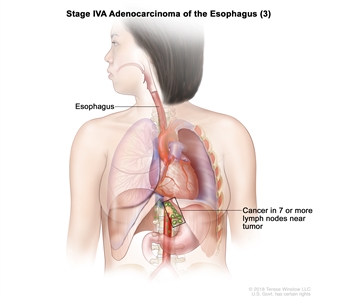
Stage IVA adenocarcinoma of the esophagus (3). Cancer has spread to 7 or more lymph nodes near the tumor.
- into the diaphragm, azygos vein, pleura, sac around the heart, or peritoneum. Cancer is found in 3 to 6 lymph nodes near the tumor; or
- Stage IVB: Cancer has spread to other parts of the body, such as the liver or lung.
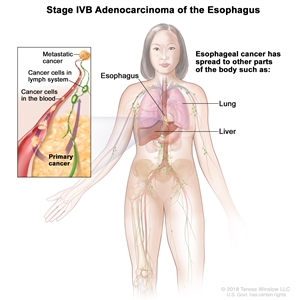
Stage IVB adenocarcinoma of the esophagus. Cancer has spread to other parts of the body, such as the liver or lung.
Esophageal cancer can recur (come back) after it has been treated.
The cancer may come back in the esophagus or in other parts of the body.
Treatment Option Overview
There are different types of treatment for patients with esophageal cancer.
Different types of treatment are available for patients with esophageal cancer. Some treatments are standard (the currently used treatment), and some are being tested in clinical trials. A treatment clinical trial is a research study meant to help improve current treatments or obtain information on new treatments for patients with cancer. When clinical trials show that a new treatment is better than the standard treatment, the new treatment may become the standard treatment. Patients may want to think about taking part in a clinical trial. Some clinical trials are open only to patients who have not started treatment.
Patients have special nutritional needs during treatment for esophageal cancer.
Many people with esophageal cancer find it hard to eat because they have trouble swallowing. The esophagus may be narrowed by the tumor or as a side effect of treatment. Some patients may receive nutrients directly into a vein. Others may need a feeding tube (a flexible plastic tube that is passed through the nose or mouth into the stomach) until they are able to eat on their own.
The following types of treatment are used:
Surgery
Surgery is the most common treatment for cancer of the esophagus. Part of the esophagus may be removed in an operation called an esophagectomy. 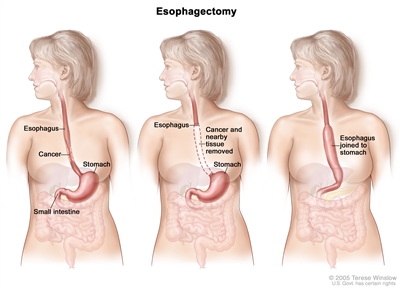
Esophagectomy. A portion of the esophagus is removed and the stomach is pulled up and joined to the remaining esophagus. The doctor will connect the remaining healthy part of the esophagus to the stomach so the patient can still swallow. A plastic tube or part of the intestine may be used to make the connection. Lymph nodes near the esophagus may also be removed and viewed under a microscope to see if they contain cancer. If the esophagus is partly blocked by the tumor, an expandable metal stent (tube) may be placed inside the esophagus to help keep it open.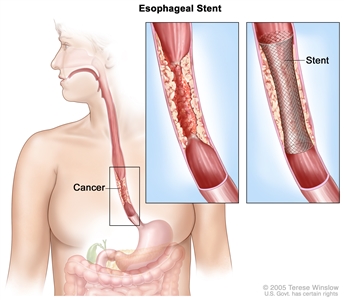
Esophageal stent. A device (stent) is placed in the esophagus to keep it open to allow food and liquids to pass through into the stomach.
Small, early-stage cancer and high-grade dysplasia of the esophagus may be removed by endoscopic resection. An endoscope (a thin, tube-like instrument with a light and a lens for viewing) is inserted through a small incision (cut) in the skin or through an opening in the body, such as the mouth. A tool attached to the endoscope is used to remove tissue.
Radiation therapy
Radiation therapy is a cancer treatment that uses high-energy x-rays or other types of radiation to kill cancer cells or keep them from growing. There are two types of radiation therapy:
- External radiation therapy uses a machine outside the body to send radiation toward the area of the body with cancer.
- Internal radiation therapy uses a radioactive substance sealed in needles, seeds, wires, or catheters that are placed directly into or near the cancer.
The way the radiation therapy is given depends on the type and stage of the cancer being treated. External and internal radiation therapy are used to treat esophageal cancer.
A plastic tube may be inserted into the esophagus to keep it open during radiation therapy. This is called intraluminal intubation and dilation.
Chemotherapy
Chemotherapy is a cancer treatment that uses drugs to stop the growth of cancer cells, either by killing the cells or by stopping them from dividing. When chemotherapy is taken by mouth or injected into a vein or muscle, the drugs enter the bloodstream and can reach cancer cells throughout the body (systemic chemotherapy). When chemotherapy is placed directly into the cerebrospinal fluid, an organ, or a body cavity such as the abdomen, the drugs mainly affect cancer cells in those areas (regional chemotherapy). The way the chemotherapy is given depends on the type and stage of the cancer being treated.
See
Chemoradiation therapy
Chemoradiation therapy combines chemotherapy and radiation therapy to increase the effects of both.
Laser therapy
Laser therapy is a cancer treatment that uses a laser beam (a narrow beam of intense light) to kill cancer cells.
Electrocoagulation
Electrocoagulation is the use of an electric current to kill cancer cells.
Immunotherapy
Immunotherapy is a treatment that uses the patient's immune system to fight cancer. Substances made by the body or made in a laboratory are used to boost, direct, or restore the body's natural defenses against cancer.
Immune checkpoint inhibitor therapy is a type of immunotherapy being studied to treat patients with advanced esophageal cancer that cannot be removed by surgery and recurrent esophageal cancer. Some types of immune cells, such as T cells, and some cancer cells have certain proteins, called checkpoint proteins, on their surface that keep immune responses in check. When cancer cells have large amounts of these proteins, they will not be attacked and killed by T cells. Immune checkpoint inhibitors block these proteins and the ability of T cells to kill cancer cells is increased.
There are two types of immune checkpoint inhibitor therapy:
- CTLA-4 inhibitor therapy: CTLA-4 is a protein on the surface of T cells that helps keep the body's immune responses in check. When CTLA-4 attaches to another protein called B7 on a cancer cell, it stops the T cell from killing the cancer cell. CTLA-4 inhibitors attach to CTLA-4 and allow the T cells to kill cancer cells. Ipilimumab is a type of CTLA-4 inhibitor.
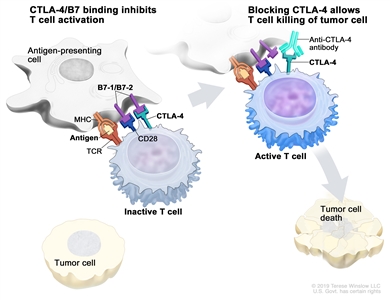
Immune checkpoint inhibitor. Checkpoint proteins, such as B7-1/B7-2 on antigen-presenting cells (APC) and CTLA-4 on T cells, help keep the body's immune responses in check. When the T-cell receptor (TCR) binds to antigen and major histocompatibility complex (MHC) proteins on the APC and CD28 binds to B7-1/B7-2 on the APC, the T cell can be activated. However, the binding of B7-1/B7-2 to CTLA-4 keeps the T cells in the inactive state so they are not able to kill tumor cells in the body (left panel). Blocking the binding of B7-1/B7-2 to CTLA-4 with an immune checkpoint inhibitor (anti-CTLA-4 antibody) allows the T cells to be active and to kill tumor cells (right panel). - PD-1 and PD-L1 inhibitor therapy: PD-1 is a protein on the surface of T cells that helps keep the body's immune responses in check. PD-L1 is a protein found on some types of cancer cells. When PD-1 attaches to PD-L1, it stops the T cell from killing the cancer cell. PD-1 and PD-L1 inhibitors keep PD-1 and PD-L1 proteins from attaching to each other. This allows the T cells to kill cancer cells. Nivolumab is a type of PD-1 inhibitor.
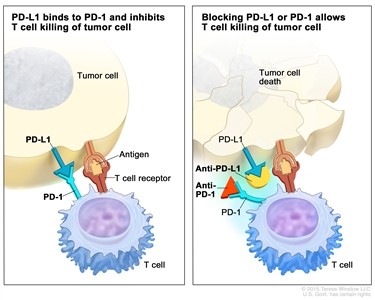
Immune checkpoint inhibitor. Checkpoint proteins, such as PD-L1 on tumor cells and PD-1 on T cells, help keep immune responses in check. The binding of PD-L1 to PD-1 keeps T cells from killing tumor cells in the body (left panel). Blocking the binding of PD-L1 to PD-1 with an immune checkpoint inhibitor (anti-PD-L1 or anti-PD-1) allows the T cells to kill tumor cells (right panel). immune checkpoint inhibitorsImmunotherapy uses the body's immune system to fight cancer. This animation explains one type of immunotherapy that uses immune checkpoint inhibitors to treat cancer.
New types of treatment are being tested in clinical trials.
This summary section describes treatments that are being studied in clinical trials. It may not mention every new treatment being studied. Information about clinical trials is available from the
Targeted therapy
Targeted therapy is a type of treatment that uses drugs or other substances to identify and attack specific cancer cells. Monoclonal antibody therapy is a type of targeted therapy used in the treatment of esophageal cancer.
Monoclonal antibodies are immune system proteins made in the laboratory to treat many diseases, including cancer. As a cancer treatment, these antibodies can attach to a specific target on cancer cells or other cells that may help cancer cells grow. The antibodies are able to then kill the cancer cells, block their growth, or keep them from spreading. Monoclonal antibodies are given by infusion. They may be used alone or to carry drugs, toxins, or radioactive material directly to cancer cells. monoclonal antibodies: how monoclonal antibodies treat cancerHow do monoclonal antibodies work to treat cancer? This video shows how monoclonal antibodies, such as trastuzumab, pembrolizumab, and rituximab, block molecules cancer cells need to grow, flag cancer cells for destruction by the body's immune system, or deliver harmful substances to cancer cells.
Treatment for esophageal cancer may cause side effects.
For information about side effects caused by treatment for cancer, visit our
Patients may want to think about taking part in a clinical trial.
For some patients, taking part in a clinical trial may be the best treatment choice. Clinical trials are part of the cancer research process. Clinical trials are done to find out if new cancer treatments are safe and effective or better than the standard treatment.
Many of today's standard treatments for cancer are based on earlier clinical trials. Patients who take part in a clinical trial may receive the standard treatment or be among the first to receive a new treatment.
Patients who take part in clinical trials also help improve the way cancer will be treated in the future. Even when clinical trials do not lead to effective new treatments, they often answer important questions and help move research forward.
Patients can enter clinical trials before, during, or after starting their cancer treatment.
Some clinical trials only include patients who have not yet received treatment. Other trials test treatments for patients whose cancer has not gotten better. There are also clinical trials that test new ways to stop cancer from recurring (coming back) or reduce the side effects of cancer treatment.
Clinical trials are taking place in many parts of the country. Information about clinical trials supported by NCI can be found on NCI's
Follow-up tests may be needed.
As you go through treatment, you will have follow-up tests or check-ups. Some tests that were done to diagnose or stage the cancer may be repeated to see how well the treatment is working. Decisions about whether to continue, change, or stop treatment may be based on the results of these tests.
Some of the tests will continue to be done from time to time after treatment has ended. The results of these tests can show if your condition has changed or if the cancer has recurred (come back).
Treatment of Stage 0 (High-grade Dysplasia)
For information about the treatments listed below, see the
Treatment of stage 0 may include the following:
- Surgery.
- Endoscopic mucosal resection.
Use our
Treatment of Stage I Esophageal Cancer
For information about the treatments listed below, see the
Treatment of stage I esophageal squamous cell carcinoma or adenocarcinoma may include the following:
- Chemoradiation therapy followed by surgery.
- Surgery alone.
Use our
Treatment of Stage II Esophageal Cancer
For information about the treatments listed below, see the
Treatment of stage II esophageal squamous cell carcinoma or adenocarcinoma may include the following:
- Chemoradiation therapy followed by surgery.
- Surgery alone.
- Chemotherapy followed by surgery.
- Chemoradiation therapy alone.
Use our
Treatment of Stage III Esophageal Cancer
For information about the treatments listed below, see the
Treatment of stage III esophageal squamous cell carcinoma or adenocarcinoma may include the following:
- Chemoradiation therapy followed by surgery.
- Chemotherapy followed by surgery.
- Chemoradiation therapy alone.
Use our
Treatment of Stage IV Esophageal Cancer
For information about the treatments listed below, see the
Treatment of stage IV esophageal squamous cell carcinoma or stage IV esophageal adenocarcinoma may include the following:
- Chemoradiation therapy followed by surgery.
- Chemotherapy.
- Adjuvant therapy given after chemoradiation therapy for patients with esophageal adenocarcinoma, esophageal squamous cell carcinoma, or gastroesophageal junction cancer.
- Immunotherapy and chemoimmunotherapy for patients with previously untreated, unresectable, advanced, or metastatic esophageal squamous cell carcinoma.
- Immunotherapy and chemoimmunotherapy for patients with previously untreated, unresectable, advanced or metastatic esophageal adenocarcinoma or gastroesophageal junction cancer.
- Immunotherapy for patients with cancer that recurs after one type of therapy.
- Nivolumab and chemotherapy for patients with adenocarcinoma.
- Laser therapy or electrocoagulation as palliative therapy to relieve symptoms and improve quality of life.
- An esophageal stent as palliative therapy to relieve symptoms and improve quality of life.
- Radiation therapy with or without intraluminal intubation and dilation.
- Esophageal brachytherapy, which delivers a high dose of radiation therapy to the tumor while limiting the dose to nearby organs, as palliative therapy for dysphagia.
- Clinical trials of chemotherapy with one or more drugs.
Use our
Treatment of Recurrent Esophageal Cancer
All patients with recurrent esophageal cancer should consider entering a clinical trial as outlined in the
Treatment of recurrent esophageal cancer may include the following:
- Use of certain treatments as palliative therapy to relieve symptoms and improve quality of life.
- Immunotherapy (nivolumab) and chemoimmunotherapy for patients with recurrent esophageal squamous cell carcinoma.
- Clinical trials.
Use our
To Learn More About Esophageal Cancer
For more information from the National Cancer Institute about esophageal cancer, see the following:
-
Esophageal Cancer Home Page -
Esophageal Cancer Prevention -
Esophageal Cancer Screening -
Childhood Esophageal Cancer Treatment -
Gastrointestinal Stromal Tumors Treatment -
Nutrition During Cancer Treatment -
Oral Complications of Cancer Therapies -
Tobacco (includes help with quitting) -
Lasers to Treat Cancer
For general cancer information and other resources from the National Cancer Institute, visit:
-
About Cancer -
Cancer Staging -
Chemotherapy and You: Support for People With Cancer -
Radiation Therapy and You: Support for People With Cancer -
Coping with Cancer -
Questions to Ask Your Doctor about Cancer -
For Survivors, Caregivers, and Advocates
About This PDQ Summary
About PDQ
Physician Data Query (PDQ) is the National Cancer Institute's (NCI's) comprehensive cancer information database. The PDQ database contains summaries of the latest published information on cancer prevention, detection, genetics, treatment, supportive care, and complementary and alternative medicine. Most summaries come in two versions. The health professional versions have detailed information written in technical language. The patient versions are written in easy-to-understand, nontechnical language. Both versions have cancer information that is accurate and up to date and most versions are also available in
PDQ is a service of the NCI. The NCI is part of the National Institutes of Health (NIH). NIH is the federal government's center of biomedical research. The PDQ summaries are based on an independent review of the medical literature. They are not policy statements of the NCI or the NIH.
Purpose of This Summary
This PDQ cancer information summary has current information about the treatment of adult esophageal cancer. It is meant to inform and help patients, families, and caregivers. It does not give formal guidelines or recommendations for making decisions about health care.
Reviewers and Updates
Editorial Boards write the PDQ cancer information summaries and keep them up to date. These Boards are made up of experts in cancer treatment and other specialties related to cancer. The summaries are reviewed regularly and changes are made when there is new information. The date on each summary ("Updated") is the date of the most recent change.
The information in this patient summary was taken from the health professional version, which is reviewed regularly and updated as needed, by the
Clinical Trial Information
A clinical trial is a study to answer a scientific question, such as whether one treatment is better than another. Trials are based on past studies and what has been learned in the laboratory. Each trial answers certain scientific questions in order to find new and better ways to help cancer patients. During treatment clinical trials, information is collected about the effects of a new treatment and how well it works. If a clinical trial shows that a new treatment is better than one currently being used, the new treatment may become "standard." Patients may want to think about taking part in a clinical trial. Some clinical trials are open only to patients who have not started treatment.
Clinical trials can be found online at
Permission to Use This Summary
PDQ is a registered trademark. The content of PDQ documents can be used freely as text. It cannot be identified as an NCI PDQ cancer information summary unless the whole summary is shown and it is updated regularly. However, a user would be allowed to write a sentence such as "NCI's PDQ cancer information summary about breast cancer prevention states the risks in the following way: [include excerpt from the summary]."
The best way to cite this PDQ summary is:
PDQ® Adult Treatment Editorial Board. PDQ Esophageal Cancer Treatment. Bethesda, MD: National Cancer Institute. Updated <MM/DD/YYYY>. Available at:
Images in this summary are used with permission of the author(s), artist, and/or publisher for use in the PDQ summaries only. If you want to use an image from a PDQ summary and you are not using the whole summary, you must get permission from the owner. It cannot be given by the National Cancer Institute. Information about using the images in this summary, along with many other images related to cancer can be found in
Disclaimer
The information in these summaries should not be used to make decisions about insurance reimbursement. More information on insurance coverage is available on Cancer.gov on the
Contact Us
More information about contacting us or receiving help with the Cancer.gov website can be found on our
Last Revised: 2024-10-15
If you want to know more about cancer and how it is treated, or if you wish to know about clinical trials for your type of cancer, you can call the NCI's Cancer Information Service at 1-800-422-6237, toll free. A trained information specialist can talk with you and answer your questions.
This information does not replace the advice of a doctor. Ignite Healthwise, LLC, disclaims any warranty or liability for your use of this information. Your use of this information means that you agree to the
Healthwise, Healthwise for every health decision, and the Healthwise logo are trademarks of Ignite Healthwise, LLC.
Page Footer
I want to...
Audiences
Secure Member Sites
The Cigna Group Information
Disclaimer
Individual and family medical and dental insurance plans are insured by Cigna Health and Life Insurance Company (CHLIC), Cigna HealthCare of Arizona, Inc., Cigna HealthCare of Illinois, Inc., Cigna HealthCare of Georgia, Inc., Cigna HealthCare of North Carolina, Inc., Cigna HealthCare of South Carolina, Inc., and Cigna HealthCare of Texas, Inc. Group health insurance and health benefit plans are insured or administered by CHLIC, Connecticut General Life Insurance Company (CGLIC), or their affiliates (see
All insurance policies and group benefit plans contain exclusions and limitations. For availability, costs and complete details of coverage, contact a licensed agent or Cigna sales representative. This website is not intended for residents of New Mexico.